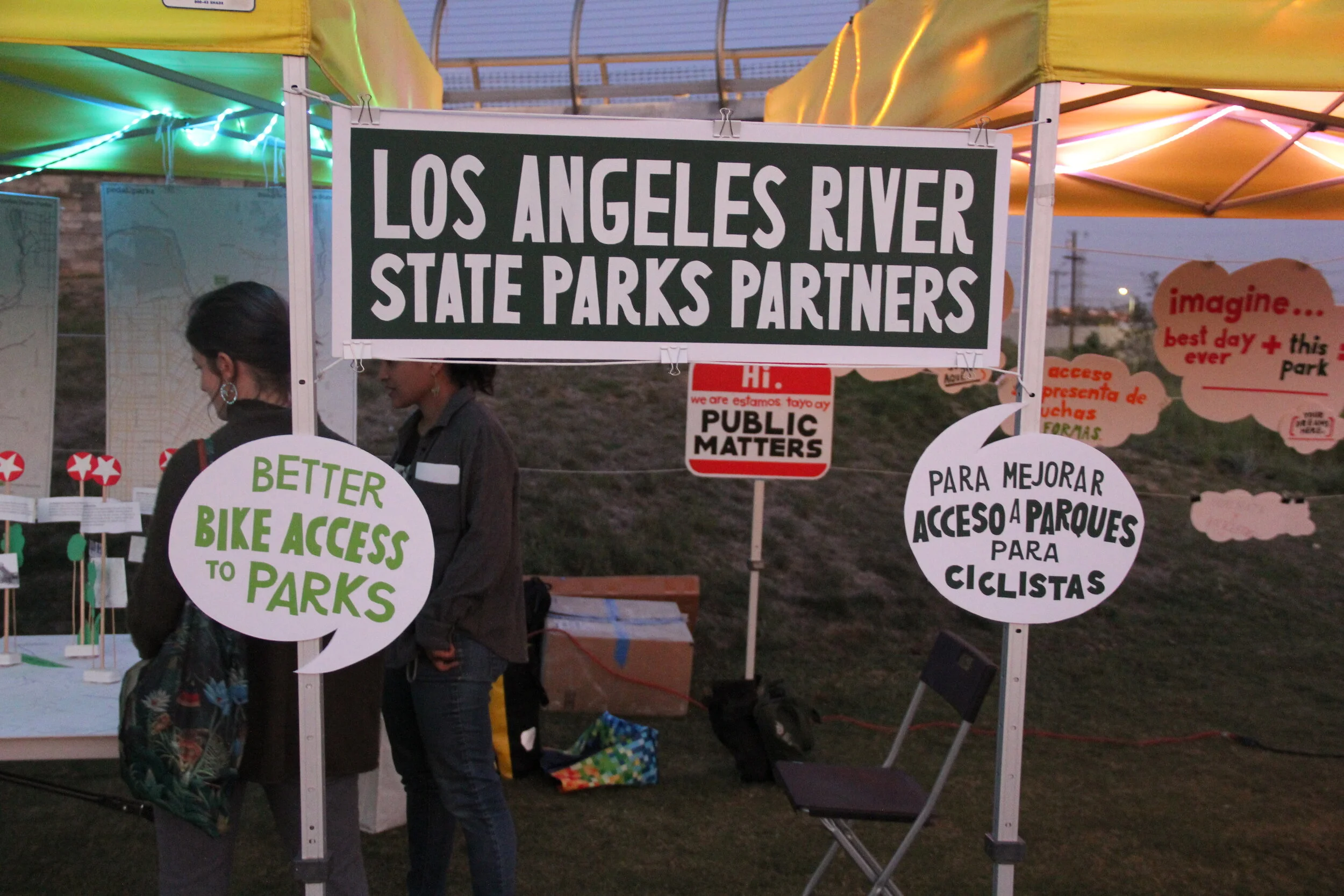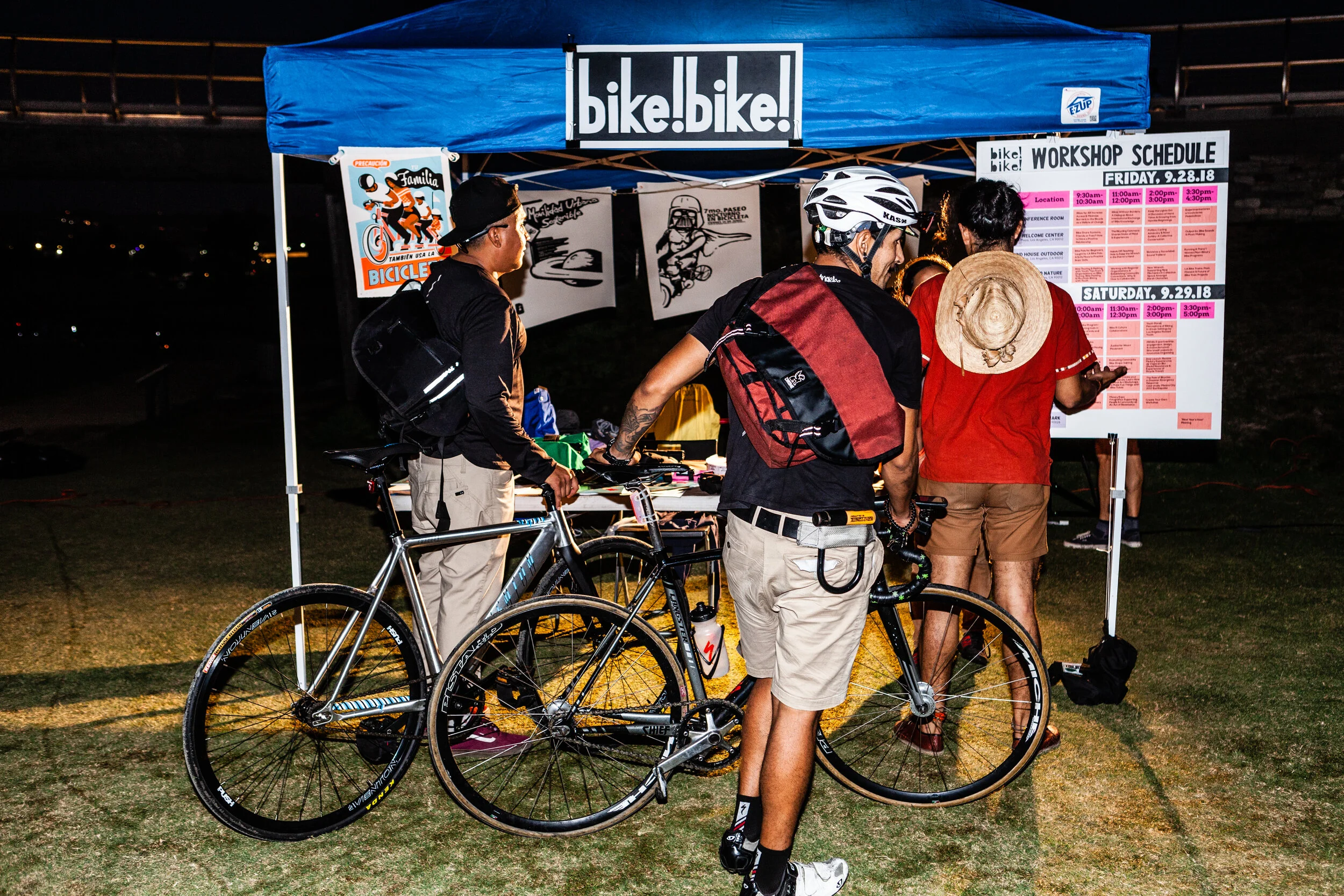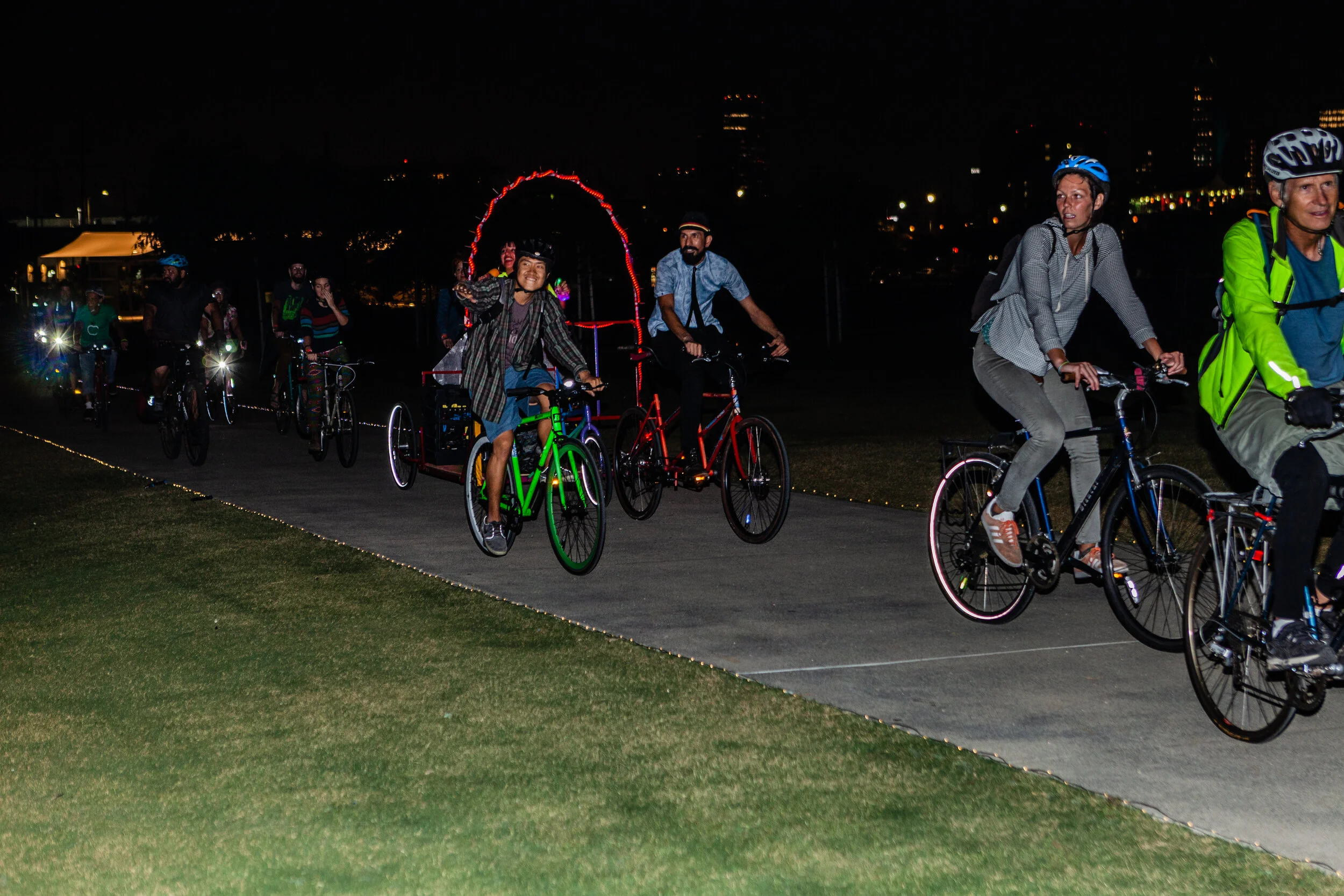
Signs at the pedal2parks welcomes Bike!Bike! Party in September 2018. (Photo: Los Angeles River State Park Partners)
Every organization in the Change Network starts by focusing on one community and going deep to become of, by, and for them. We find that starting with one community enables an organization to really listen and connect with that one group--and to build skills that staff can later use to engage many other communities.
For the LA River State Park Partners, picking their first community of interest was a tough choice. Los Angeles River State Park Partners joined the OF/BY/FOR ALL Change Network to bring value to their community- but which community should they focus on first?
Los Angeles is a diverse city with a myriad of communities to work with. LA River State Park Partners is a nonprofit with just one staff member: program director Jenny Aleman-Zometa. It’s tempting to go big and include everyone, but Jenny recognized that getting specific would help her focus her time and resources to make real change. Given that LA River State Park Partners had started to build relationships around an international Bike!Bike! conference in 2018, the nonprofit decided to focus on the bicycle community.
“We are committed to community engagement, bringing people in the parks and developing a space that can be accessed and enjoyed by everybody. Bike communities felt like a natural fit. It's been helpful to focus on this one community and work with them,” said Jenny.
But which Bike Community?
An avid cyclist herself, Jenny already had access to bike groups and The OF/BY/FOR ALL process equipped her with tools to deepen her understanding of the bike community. But she soon realized the bike community does not consist of only one bike culture- It consisted of several. Her original concept of “one” LA bike community was more imagined than real.
“It does makes outreach a bit tough because we’re not sure who to engage. But we aren't dissuaded by it,” said Jenny.
LA River State Park Partners approached the community with the assumption that bicycles were a part of a cyclist’s identity. That everything would be all about bicycles and bicycling. But this wasn’t the case. When they spoke to the bicycle groups, they found the conversations were often not about bikes at all.
In their first few months, they connected with three distinct bike communities:
-
Commuters who have adopted cycling as part of their daily life and how they move and relate to the world.
-
Bike collectives such as the Bicycle Kitchen and Bike Oven, which provide workshops catering to individuals eager to learn how to fix their own bikes or want to teach their children bike mechanics.
-
People interested in group riding activities like The Passage, which conducts a weekly nighttime urban exploration ride or the LA Critical Mass, America’s largest community bicycle ride with over 4,000 cyclists exploring LA together.

A group of young cyclists with road bikes stopping by Los Angeles State Historic Park's First Friday Campfire. (Photo: Los Angeles River State Park Partners)
“There are many bike communities here,” said Peter Choi, a Bicycle Kitchen volunteer. “They range from the radically inclusive to the radically intersectional, and they are mostly independent and different from each other. For example, there are at least three more community bike shops like us, and we serve similar functions but are far spread apart and have very different vibes. As separate as we all seem, we all have a shared history in a sense that someone from a group has collaborated with another at some point. There are few barriers to form your own community in LA.”
Making Inroads
Jenny and her board decided to focus on bike collectives. They saw these collectives as communities with existing social connections - connections they could use to build both deeper and broader relationships over time. LA River State Park Partners are centering their efforts on their available resources. They have access to three parks, the Bicycle Kitchen collective, and the contacts they made through the Bike!Bike! conference.
LA River State Park Partners collaborated with the Bicycle Kitchen to run free fix-a-flat workshops at the park. The turnout was sparse at times, but the two partners have hope word will spread. They are planning to expand the pilot to a bimonthly open space bike workshop at the park.
“Parks are already open and inviting spaces. If we could raise awareness that they are there and can be available for doing new things like in the case of Bike!Bike!, the bike community may strive for bigger projects. It felt very rewarding when different groups of people were allowed to converge in a public space and create workshops and strengthen our social network. Also, bike communities like to share knowledge and experience, so parks would be ideal places for cyclists and non-cyclists to meet,” said Peter.

Three cyclists holding their bikes check out the Bike!Bike! 2018 Conference schedule posted on support beam of an outdoor pop-up tent. (Photo: Frank Hom - http://frankhom.com/)
Evaluate and Reevaluate
Understanding and connecting with a complex community is a challenge that takes courage- and a willingness to make mistakes. Jenny, her board of directors, and their local partners are relentlessly evaluating their outreach strategies. They depend on each other to grow the bike community in the parks, especially during this exploration stage.
“It’s trial and error. We’re seeing what sticks. Maybe the workshop isn’t something people are interested in. Maybe it is. We’ll reevaluate after spring to see how to move forward,” said Jenny. “Our idea is to have bike groups at the park but we also want to leave room for them to do what they want to do.”
For Fabian Wagmister, a long-time community member and board member of LA River State Park Partners, this community work cuts a path to re-imagine Los Angeles as a more equitable, shared city.
“The bicycle is a unifying and equalizing vehicle,” said Fabian. “LA is diverse ethnically and income-wise. It’s really compelling to bring all those people together using the bike as a bridge. All three parks are a great opportunity to enable more people re-imagine themselves in the city through the bicycle. To re-imagine themselves as a community of people who are transforming the city through their bicycling.”

A bike train arriving to Los Angeles State Historic Park for the pedal2parks welcomes Bike!Bike! Party. (Photo: Frank Hom - http://frankhom.com/)
Want to take this kind of inclusive journey with your organization? Learn more about the OF/BY/FOR ALL Change Network.
This post was written with support from Titania Veda.
